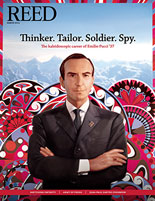
IRIS login | Reed College home Volume 93, No. 1: March 2014
Addressing Headress
I'm writing about a recent article published about RKSK (Apocrypha, September 2013). It includes a picture of someone wearing a feathered headdress at Noise Parade in 2008. Wearing Native American garb in this context is a form of racist cultural appropriation, and publishing this picture is no different. Cultural appropriation is dangerous because it allows us to forget that the cultures we have subjugated continue to exist on the margins of our society and beyond our imaginary past. It becomes possible for us to ignore the ways our society continues to infringe upon the human rights of the indigenous. So where are the Clackamas, the Multnomah, and the other tribes displaced to make way for our society and our college? The Yakama, the Umatilla, and other tribes across the U.S. and Canada are fighting the expansion of fossil fuel extraction that threatens their health and their land. This is an industry that Reed College has tens of millions of dollars invested in. There is something deeply wrong when our community is comfortable mocking the indigenous while helping to finance their genocide. Racism is ubiquitous in our society. The Native Americans objecting to this kind of representation tend to be invisible. This is not an excuse for our community to perpetuate racist representations. I think it is totally unacceptable for us to profess ignorance about how this image plays into societal systems of oppression. This problem is symptomatic of a culture at Reed that has not found it useful to implement gender or ethnic studies programs, which would help us mitigate oppression by offering us a critical lens by which to examine the politics of our everyday lives. I hope RKSK, the Reed magazine staff, and our community will take this as an opportunity to critically examine our cultural position and be mindful of how easy it is to perpetuate racism, sexism, and classism. Websites about these topics are easy to find, and the college's Multicultural Resource Center has a lot to offer. I hope this conversation doesn't end here.

LATEST COMMENTS
steve-jobs-1976 I knew Steve Jobs when he was on the second floor of Quincy. (Fall...
Utnapishtim - 2 weeks ago
Prof. Mason Drukman [political science 1964–70] This is gold, pure gold. God bless, Prof. Drukman.
puredog - 1 month ago
virginia-davis-1965 Such a good friend & compatriot in the day of Satyricon...
czarchasm - 4 months ago
John Peara Baba 1990 John died of a broken heart from losing his mom and then his...
kodachrome - 7 months ago
Carol Sawyer 1962 Who wrote this obit? I'm writing something about Carol Sawyer...
MsLaurie Pepper - 8 months ago
William W. Wissman MAT 1969 ...and THREE sisters. Sabra, the oldest, Mary, the middle, and...
riclf - 10 months ago